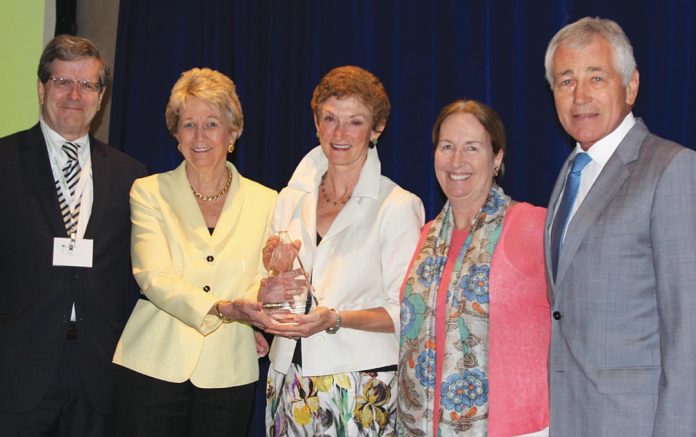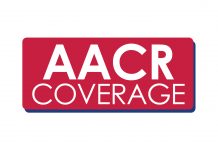
By James L. Mulshine, MD
On June 13, 2016, the Prevent Cancer Foundation hosted the 13th Annual Quantitative Imaging Workshop: Lung Cancer, COPD and Cardiovascular Disease – Exploring the Intersections. A major focus of the meeting related to optimization of CT imaging issues as the nation begins to implement CT screening for lung cancer. It was appropriate then that the meeting started with the awarding of the 4th James L. Mulshine, MD Leadership Award, which recognized the remarkable efforts of Laurie Fenton Ambrose, President and CEO of the Lung Cancer Alliance, for her many accomplishments but most specifically for her efforts in guiding patient advocacy and other stakeholder groups in the successful efforts to gain coverage of lung cancer screening by the Centers for Medicare & Medicaid Services (CMS).
Two special guests gave the award to Ms. Fenton Ambrose: Professor Cheryl Healton, Dean of the College of Global Public Health at New York University, and former Secretary of Defense Chuck Hagel. In their comments, they framed how Mrs. Fenton Ambrose has brought a strategic vision, energy, and a deep understanding of consensus building to advocacy of lung cancer patients and those at risk for lung cancer. These efforts included both an effective dialogue with the Secretary of Health and Human Services as well as the development of a broad consortium of supportive advocacy groups, academic institutions, and other interested institutions. Collectively, these efforts were pivotal to the issuance of a national coverage decision by the CMS.
Laurie Fenton Ambrose serves as the President and CEO of Lung Cancer Alliance. This foundation has developed a number of impactful lung cancer advocacy programs such as the National Framework for Screening Excellence, a consortial effort to implement highquality lung cancer screening services among the 400 screening delivery healthcare institutions that have joined this effort.
Another highlight of the meeting was a crowdsourcing evaluation of the imaging performance of CT scanners from lung cancer screening sites. Ricardo Avila, CEO of Accumetra LLC, an advanced imaging technology company, described the preliminary results of the CT Imaging Protocol Challenge. This involved measuring identical objects at different screening sites using a variety of scanners, in this case 26 different screening sites using 53 different scanners. While considerable variability was found, by changing the CT scanner acquisition settings, a large fraction of the variability could fortunately be reversed. The CT image-quality reports were generated within 20 minutes of sending the data to the website, allowing sites to rapidly adjust their settings and submit new scans to see if there was an improvement.
This image-quality assessment experience stimulated a deep discussion over the course of the Workshop on defining processes to ensure accuracy with quantitative imaging measurement, not only for lung cancer screening management but also for CT-based lung cancer treatment response assessment. These discussions including representatives from the drug and imaging industry, the Quantitative Imaging Biomarker Alliance, the FDA, the National Cancer Institute, the National Institute of Standards, the National Photonics Initiative, lung cancer advocacy groups, and academics and representatives from a number of institutions that currently are offering lung cancer screening services. Next steps for the Workshop include a broader dialogue to align with efforts related to the Vice President’s Moonshot Initiative, with the goal of accelerating our progress in improving lung cancer outcomes. In parallel, discussions with COPD researchers and advocates as well as cardiovascular researchers and advocates about shared opportunities to optimize health information yield from the lung cancer screening encounter will continue, especially around image quality and health economics issues.









